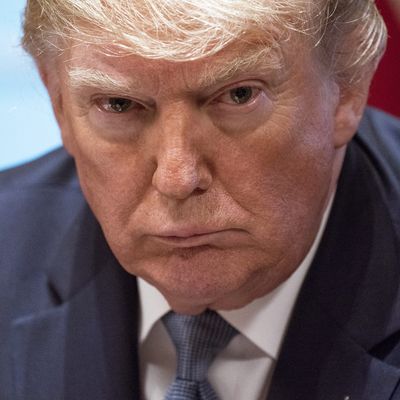
Of the 51 state attorneys general, 26 are Republican. And of those, 21 have signed a new letter denouncing impeachment as an offense to the Constitution. President Trump has tweeted excitedly in all-caps about the letter (or, more precisely, mentions of the letter he has seen on Fox News), and the Wall Street Journal editorial page lavishes the note with favorable attention.
Amusingly, the letter is premised on a clear error of fact. In keeping with the claims of Trump’s legal team, it asserts that he did not violate the law, and proceeds to argue that a president cannot be impeached “for acting in a legal manner.” In fact, Trump did violate the law. During the summer of 2019, numerous officials expressed their belief that Trump’s refusal to disperse the military aid to Ukraine that Congress had passed into law was illegal. Last week, the Government Accountability Office confirmed the truth of this rather obvious suspicion.
What probably happened is that the Republican attorneys formed their argument before the GAO demolished its premise. (Coordinating a 14-page letter, of which 21 politically ambitious people have to agree on every word, takes time.) It is probably too late to go back to the drawing board and devise a completely different legal rationale for letting Trump extort foreign countries to smear his domestic opponents. And so, like the Black Knight with its limbs cut off, the Republican letter simply goes on as if nobody can see that its entire foundation is gone.
Proceeding from its debunked claim, the Republican letter argues that, since Trump’s actions were supposedly legal, the only basis for impeaching him is his allegedly corrupt motives. And motives are nothing more than thoughts! “Article I is based upon a constitutionally-flawed theory that the President can be impeached for exercising concededly lawful constitutional authority ‘motivated’ by thoughts a House majority unilaterally deems ‘corrupt,’” it reasons. Therefore, Trump “is being impeached for a political thought crime.”
Obviously, if Trump were being impeached for corrupt “thoughts,” the articles would include such sentiments as his desires to prosecute his political enemies, ban independent media, beat up protesters, extend his terms in office beyond constitutional limits, and other authoritarian fantasies he has not merely thought but expressed publicly.
But then, having reduced Trump’s misdeeds to mere thoughts, the letter goes a step further, reducing his desire to smear domestic opponents with trumped-up investigations by a foreign government to a simple desire for political gain. Trump just desired the same thing all presidents desire, the letter argues:
Politicians regularly act in an official capacity in ways that are or may have political benefit. This is especially true of Presidents in their role as the nation’s chief diplomat. In a 1987 speech in Berlin, for example, President Reagan beseeched, “Mr. Gorbachev, tear down this wall!” In 2008, President Bush made multiple personal appeals to then-Saudi King Abdullah to increase oil production in an effort to bring down U.S. gas prices. In January 2015, President Obama asked then-Mexican President Peña Nieto to halt the flow of illegal immigrants entering the U.S.
Indeed, Presidents routinely ask other countries to cooperate on a wide variety of matters such as trade, denuclearization, and handling of energy and other natural resources. Under House Democrats’ corrupt motives theory, however, a President who negotiates a nuclear deal with Iran or a trade deal with China can be impeached for abuse of power if the House majority believes the deal was “motivated” by a desire to enhance the President’s reelection prospects rather than to benefit the country.
So, really, if you think about it, man, all presidents are trying to be popular, so what’s the difference between Ronald Reagan denouncing the Berlin Wall and Trump sending his private lawyer and his mobbed-up partners to demand a client state announce trumped-up probes of his domestic enemies?
Of course, there is a difference between foreign policy acts that are intended to advance the national interest, and which benefit the president’s political standing incidentally, and acts that are intended solely to help the president’s political standing. Rudy Giuliani, the president’s lawyer, was perfectly aware of the distinction. That’s why he wrote a letter to Ukraine’s president saying he represented Trump “as a private citizen, not as President of the United States,” and requested a meeting “in my capacity as personal counsel to President Trump.” He was specifically negotiating foreign policy for Trump’s personal benefit.
This is why the whole scheme had to involve private lawyers. The national security bureaucracy was unwilling to participate in a shakedown for Trump’s political benefit. When Reagan gave a speech calling for Gorbachev to tear down the Berlin Wall, he was able to do it in public. He didn’t need to send off-the-books goons to deliver the message through a series of private threats.
The Republican argument that motives can’t be considered as part of an impeachment is superficially clever, but it founders on the fact that almost any abuse of power charge will involve motive. If a president ordered audits of the tax returns of his opponents, or offered pardons for anybody who murders them, he might insist he was motivated by a desire to crack down on tax evasion, or to extend clemency to felons. When more than 20 representatives of the Republican legal establishment put their names to the argument that “the Senate should not adopt the specious and legally vacuous theories of ‘corrupt motives,’” they are merely whetting the president’s appetite for more corruption and more abuse of power.






























